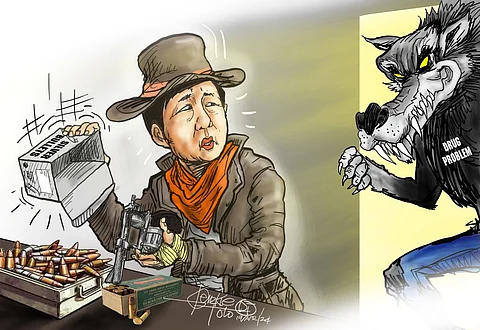
- NEWS
- the EDIT
- COMMENTARY
- BUSINESS
- LIFE
- SHOW
- ACTION
- GLOBAL GOALS
- SNAPS
- DYARYO TIRADA
- MORE

In addressing complex societal issues like the drug problem, leaders often grapple with finding effective solutions. President Marcos Jr.’s pronouncement, as he inspected the P13.3-billion drug haul in Batangas last Monday, that there is no "silver bullet" against the drug problem encapsulates the complex nature of this challenge.
The drug problem is not merely a singular issue with a straightforward solution. It permeates various aspects of society, affecting individuals, families, communities, and nations. President Marcos's acknowledgment of “no silver bullet" underscores the intricacies and depth of this problem. It acknowledges that no single approach or intervention could entirely eradicate drug-related issues. Instead, a holistic strategy is imperative.
One of the fundamental aspects highlighted by Marcos's statement is the recognition of the complexity of the factors contributing to drug proliferation. The drug trade is often intertwined with socioeconomic disparities, political instability, cultural factors, and global dynamics.
A simplistic approach focused solely on law enforcement or punitive measures overlooks these underlying complexities. As the President emphasized, he is not wont to issue threats as his predecessor was predisposed to do. Addressing the root causes, as he implied, demands a comprehensive approach encompassing prevention, treatment, rehabilitation, and social support systems.
Moreover, the "no silver bullet" approach underscores the need for evidence-based policies and interventions. Solutions cannot be based on ideological inclinations or political agendas alone. Instead, they must be grounded on empirical research, data-driven insights, and the expertise of relevant stakeholders. This necessitates a collaborative effort involving government agencies, healthcare professionals, law enforcement, community organizations, and international partners.
President Marcos's statement emphasizes the importance of adaptability and flexibility in addressing the drug problem. Societal challenges evolve over time, influenced by changing demographics, technological advancements, and shifting geopolitical landscapes. As such, strategies must be dynamic, responsive, and capable of adapting to emerging trends and challenges. A rigid and static approach risks obsolescence and ineffectiveness in tackling evolving drug-related issues.
Another critical aspect highlighted by the "no silver bullet" approach is the recognition of the interconnectedness between various policy domains. The drug problem intersects with public health, criminal justice, education, economic development, and human rights.
Isolated interventions in one domain may inadvertently exacerbate issues in others. For instance, overly punitive measures may perpetuate cycles of incarceration and recidivism, undermining efforts toward rehabilitation and social reintegration.
Therefore, the "no silver bullet" approach underscores the importance of balancing enforcement with compassion and empathy. While law enforcement plays a crucial role in disrupting illicit drug markets and dismantling criminal networks, punitive measures alone are insufficient. A punitive-centric approach often perpetuates stigma, marginalization, and human rights abuses, particularly among vulnerable populations such as substance abusers and low-income communities.
Instead, effective strategies must prioritize harm reduction, access to healthcare services, and support for individuals struggling with substance abuse disorders. By addressing the underlying health needs and socioeconomic vulnerabilities of affected individuals, society can mitigate the harms associated with drug use while promoting public safety and well-being.
As a whole, President Marcos made a point when he stressed the need for a multi-pronged approach against illegal drugs. He likewise cited the fact that even wealthy countries like America still have a drug problem. “We cannot expect a single solution,” he emphasized.
Moving forward, comprehensive strategies that integrate prevention, treatment, rehabilitation, and social support systems are essential. By continuously operating and gathering intelligence, he said the time would come when the country would eventually bring down the drug syndicates without much loss of lives.
To the chief executive, embracing evidence-based policies, collaboration, adaptability, and a balanced approach between enforcement and compassion is paramount in addressing the root causes and consequences of the drug problem.
While there may be no singular solution, concerted efforts guided by these principles offer a path toward meaningful progress and positive change.
